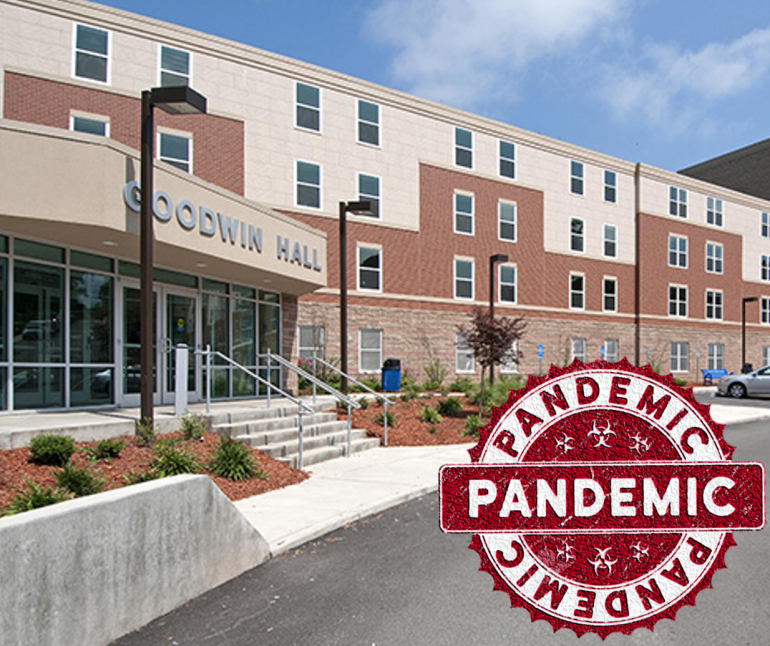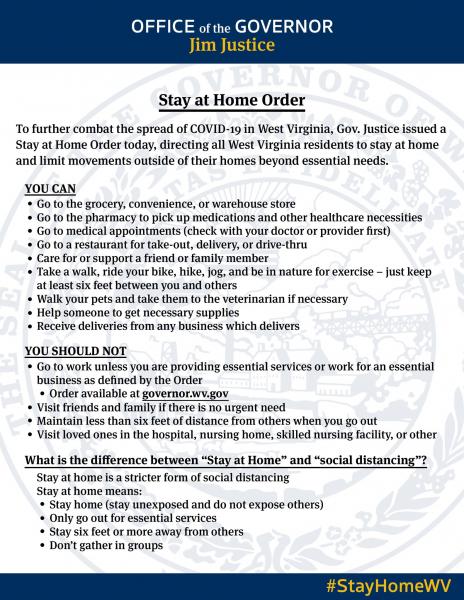
By: Sadie Murphy
As March 27 is fast approaching, some students are eager to return while others are afraid. Abby Mayle was initially excited to return but because of her mother’s feelings about her medications that suppress her immune system, she is “trying to come back but can’t make any promises.” However, she believes “Glenville is a small campus with mainly in-state students, so the possibility of an outbreak is fairly small.”
Mayle and others will no longer have to weigh this decision. Due to Governor Justice’s “stay-at-home” order, President Kathleen Nelson said, “All students who are not currently residing on campus are not to return to campus.” Shawn Blake is not so sure that this is for the best, but tells The Phoenix that finding out about this would make him “sad because that’s the only place that feels like home.”
Governor Jim Justice has scheduled for the “stay at home” order for West Virginia to start at 8 p.m. on Tuesday, March 24 The following is a post he made on Twitter to explain what this means for citizens:4

Along with the decision for students to remain put, an email to faculty from President Nelson also details faculty restrictions, how essential employees will be notified, and calls out the Governor’s lack of information regarding “annual/sick leave compensation reimbursements for those who do not work-from-home and use annual or sick leave during the stay-at-home order.”
In addition, “All and events scheduled on the campus or by college groups are canceled through the end of April. A decision regarding events scheduled in May, including commencement, will be made by mid-April. Activities relating to the presidential search process rescheduled for April are under discussion at this time.”
The GSC community has always worked to ensure its students are safe being on-campus and off-campus during this crisis. They have worked tirelessly to provide reliable information for its students. The school’s website reads “There are currently no confirmed or suspected cases of COVID-19 at GSC or in Gilmer County. Spring break for students, scheduled for March 16-20, has been extended until March 27. . . For questions or more information, email: coronavirus@glenville.edu. GSC is continuing to closely monitor updates from local, state, and national organizations in relation to COVID-19 concerns.”1
The original plan was that students planning to return to remain on campus would fill out a “mandatory travel form.” While some students would be self or mandatorily quarantined based on a review of their travel forms, others could expect for all classes to be online, libraries and computer labs to be open for students for internet access, and food to be provided in a “carry-out” style for lunch (from 11:30 A.M.- 1:00 P.M.) and dinner (from 4:30 P.M.- 6:00 P.M.) for the remainder of the semester. A lot of time will likely be spent in your dorm room, as “all campus activities and events are cancelled, recreation and fitness facilities are closed until further notice, and some buildings/facilities will be closed as well.” As of now, no information about whether the remaining resources will continue has not yet been confirmed.2
Those who chose to stay on campus during spring break have had continued “residential services provided to them, including travel using the college shuttle and food service.” During the break, students on campus experienced an “alternate operating schedule for all students living on campus as well as items available through the Pioneer Pantry.”2
Nicole Hall, a Resident Assistant at Goodwin Hall, spoke with The Phoenix about her stay on campus during spring break. While she kept her car on campus, she acknowledged that shuttle services were still running. She has used the alternate food services and admits that its just “average cafeteria food.” On March 18, students enjoyed Sloppy Joes, vegetables, rice, banana pudding with a pop or water to drink. You can pick what you’d like included in your meal by visiting dinning services on the first floor of the Mollohan Building.
Regarding possible limitations in the dorms, Hall says, “we are making people who come in to move out or get little things to wear gloves and masks along with the custodial staff cleaning everything thoroughly.” Those who have remained there are not forced to wear protective gear. Currently, neither will students returning to remain on campus. The school’s website reads, “residential students who wish to finish the semester at home will be permitted access to the residence halls to gather belongings. There will be some guidelines that must be followed for students who are accessing the building. All students and their guests must report to the main office of their respective hall where both gloves and masks will be provided for use while moving out. Goodwin Hall and Riverfront residents will report to the Goodwin Hall main lobby, and Pioneer Village residents will report to the main office located in house 8.” As of now, no information has been provided to indicate whether students will be permitted to retrieve their items on campus.2
Brittany Koutsunis agrees with Justice and GSC. She believes that no students should be permitted to return to campus. She tells The Phoenix, “I know that students whom have travelled have to fill out the travel-form so that officials can deem it necessary or not that they need to quarantine themselves upon return. That’s all fine and dandy. However, people can still have the virus and show no symptoms! I think we’re personally posing a great risk by allowing students to return if they choose to.”
Nicole Hall feels, “a lot of students will opt to stay home if they have the option and resources necessary to do online classes, so I feel like it would be just as deserted here as it is now. I feel just as safe here as anywhere.”
Though you do not have the opportunity to return to campus now and are stuck staying at home, the school’s website urges all students to “avoid close contact with people who are sick. Avoid touching your eyes, nose, and mouth. Stay home when you are sick. Cover your cough or sneeze with a tissue, then throw the tissue in the trash. Clean and disinfect frequently touched objects and surfaces using a regular household cleaning spray or wipe. Follow CDC’s recommendations for using a facemask. [The] CDC does not recommend that people who are well wear a facemask to protect themselves from respiratory diseases, including COVID-19. Facemasks should be used by people who show symptoms of COVID-19 to help prevent the spread of the disease to others. The use of facemasks is also crucial for health workers and people who are taking care of someone in close settings (at home or in a health care facility). Wash your hands often with soap and water for at least 20 seconds, especially after going to the bathroom; before eating; and after blowing your nose, coughing, or sneezing. If soap and water are not readily available, use an alcohol-based hand sanitizer with at least 60% alcohol. Always wash hands with soap and water if hands are visibly dirty.”3
For those who travelled out of the country for Spring break or plan to visit another country during the pandemic, the website warns that “Any travel plans should [be] carefully evaluated. You should also visit the Centers for Disease Control and Prevention (CDC) website to see COVID-19 specific travel guidelines. Additionally, to reduce the potential for spread, anyone who has traveled to a country under a Level 3 CDC travel warning within the last 14 days is encouraged to immediately self-isolate before returning to campus. Currently, this includes China, Cruise Ship Travel, Iran, Malaysia, Most Countries in Europe, South Korea, United Kingdom and Ireland, but should be tracked over time using the CDC travel page. You should notify the local health department in the community where you are self-isolating for further guidance and support.”3
*** An update will be provided on Thursday, March 26 with more information and a statement from President Nelson. She tells The Phoenix that students should expect to “receive a message from Vice President Carver and Provost Morris, both of which should be sent to students over the next day or two. Those messages will provide critical information to students.”
- https://www.glenville.edu/emergency/COVID-19
- https://www.glenville.edu/emergency/COVID-19/housing
- https://www.glenville.edu/emergency/COVID-19/health-wellness
Share article on:

